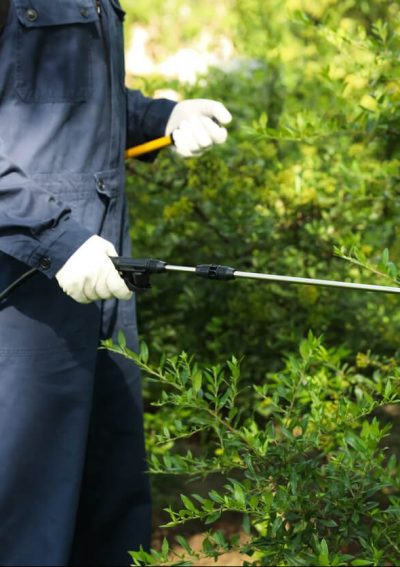Paraquat Alternatives
Chemical and natural paraquat alternatives can effectively control weeds. Increasing restrictions on paraquat use and application makes finding safe alternatives important for farmers. Safe paraquat alternatives have lower health and environmental risks than those associated with the herbicide.

Why Are Farmers Seeking Paraquat Alternatives?
Farmers are seeking alternatives to paraquat because of its poor safety profile and the application restrictions that the Environmental Protection Agency has imposed. New EPA advice released in 2021 severely limits who can apply paraquat to crops and increases training required for application certification. These factors make it difficult to purchase and apply the chemical to agricultural crops.
Paraquat has the highest fatality rate of any herbicide. Immediate health risks of ingesting paraquat include severe gastrointestinal issues and dehydration. The Centers for Disease Control reports that within days to weeks of ingesting a small to medium amount of paraquat dichloride, people can develop conditions including heart, kidney, liver and lung failure.
Studies have linked long-term Paraquat exposure to Parkinson’s disease. People injured using the herbicide have filed paraquat lawsuits against Syngenta and other chemical manufacturers for losses associated with the development of Parkinson’s disease after long-term use. Safe alternatives to paraquat offer similar benefits without the high risk to human and animal health.
Who Can Use Paraquat?
Only certified pesticide applicators can use paraquat because the EPA has classified any herbicide containing paraquat as a restricted use product. This means it has the potential to cause adverse health and environmental effects without proper precautions.
Pesticide applicator certification occurs at the state, local or tribal level, depending on where you’re applying chemicals. To apply paraquat in more than one jurisdiction, you must obtain certification from each area you operate. Individuals may also pursue either private or commercial federal pesticide applicator certification.
- Only a certified pesticide applicator can use paraquat.
- Users cannot move, transport or store it in any type of food or beverage container.
- Applicators cannot use paraquat around home gardens, schools, recreational parks, golf courses or playgrounds.
- Users cannot store paraquat in or around residential buildings
- Users must store the chemical securely to prohibit unauthorized people from having access.
The EPA issued the Paraquat Human Health Mitigation Decision in 2016. Additional regulations issued in 2021 further restrict application methods and safety requirements for workers exposed to the chemical. These actions aim to increase public knowledge about the potential risks associated with paraquat and provide guidelines for safer use.
The costs and logistics of proper storage and use of a restricted use product coupled with its high risks have pushed many farmers to seek safer alternatives to paraquat. Additionally, continued litigation has caused concern about a possible future ban on the chemical.
Safer Chemical Paraquat Alternatives for Farming
Farmers can choose several synthetic chemical alternatives to paraquat that have fewer use restrictions and better safety profiles. These include popular products such as Roundup, which contains glyphosate, and dicamba.
Many chemical alternatives, while technically considered safer than paraquat dichloride, still pose serious risks to human, animal and environmental health. Certain jurisdictions have banned some of the most common direct paraquat alternatives, such as diquat.
- Carfentrazone-ethyl
- Dicamba
- Diquat
- Diuron
- Glufosinate ammonium
- Glyphosate
- Mesotrione
- Metribuzin
Some chemical pesticides require heavy and frequent application for maximum effectiveness. This increases the potential environmental and health hazards associated with their use. According to a WWF Germany report, low use rates can help mitigate the negative impacts of paraquat alternatives. Additional safety measures, including using appropriate spray adjuvants, pressure nozzles and spray carrier volume, can help further reduce risks associated with chemical herbicides.
One of paraquat’s most attractive qualities is that it provides fast control of a wide range of weeds. Many of the chemical alternatives to paraquat offer much more limited use. As a result, farmers must use multiple chemicals and more frequent applications, which could mean greater harm from pesticides to workers and the environment.
Natural Alternatives to Paraquat
Several nonchemical, natural alternatives to paraquat exist, including cover crops, managed grazing, manual weeding and thermal weed control. Consumers are increasingly concerned with the use of chemicals on food crops. Farmers are aware of these concerns and may reduce chemical use with more natural alternatives to paraquat.
Geography and climate play a role in choosing natural weed control methods. For example, in tropical regions where overground biomass (rather than soil) holds most plant nutrients, options such as planting ground cover crops are viable solutions. Some farmers have found that acidic bioferments produced on site provide immediate burn-down of weeds without the hazards associated with chemical herbicides.
- Controlled grazing
- Integrated weed management practices
- Living mulch
- Mechanical weeding
- Thermal weeding
Natural alternatives to paraquat eliminate the immediate and long-term health risks of chemical herbicides. Additionally, some natural paraquat alternatives can become vital components of farm systems. For example, hybrid rye is a cover crop that farmers can also harvest to mill or use as animal feed.
Farmers can see other significant benefits when choosing natural alternatives as well. Cover crops and other regenerative practices improve soil quality over time, resulting in higher yields. At the same time, not purchasing agrichemicals can save farmers can save significant amounts of money.
14 Cited Research Articles
Consumernotice.org adheres to the highest ethical standards for content production and references only credible sources of information, including government reports, interviews with experts, highly regarded nonprofit organizations, peer-reviewed journals, court records and academic organizations. You can learn more about our dedication to relevance, accuracy and transparency by reading our editorial policy.
- EPA. (2023, October 4). Paraquat Dichloride: One Sip Can Kill. Retrieved from https://www.epa.gov/pesticide-worker-safety/paraquat-dichloride-one-sip-can-kill
- EPA. (2023, July 6). Paraquat Dichloride. Retrieved from https://www.epa.gov/ingredients-used-pesticide-products/paraquat-dichloride
- EPA. (2023, June 26). EPA Finalizes New, Stronger Safety Measures for Pesticide Paraquat. Retrieved from https://www.epa.gov/pesticides/epa-finalizes-new-stronger-safety-measures-pesticide-paraquat
- EPA. (2023, May 19). Paraquat Dichloride Training for Certified Applicators. Retrieved from https://www.epa.gov/pesticide-worker-safety/paraquat-dichloride-training-certified-applicators
- EPA. (2023, April 10). Federal Certification Standards for Pesticide Applicators. Retrieved from https://www.epa.gov/pesticide-worker-safety/federal-certification-standards-pesticide-applicators
- Center for Pesticide Suicide Prevention. (2023, January 12). Deadly pesticide can be replaced by safer alternatives, new study shows. Retrieved from https://centrepsp.org/media/news/deadly-pesticide-can-be-replaced-by-safer-alternatives-new-study-shows/#
- Stuart, A.M., et al. (2023, January 9). Agriculture without paraquat is feasible without loss of productivity—lessons learned from phasing out a highly hazardous herbicide. Retrieved from https://doi.org/10.1007/s11356-022-24951-0
- EPA. (2022, November 3). Restricted Use Products (RUP) Report. Retrieved from https://www.epa.gov/pesticide-worker-safety/restricted-use-products-rup-report
- Kanissery, R. (2022, January 11). Paraquat Alternatives for Citrus Weed Control. Retrieved from https://citrusindustry.net/2022/01/11/paraquat-alternatives-for-citrus-weed-control/
- Pesticide Action Network UK. (2021, November 8). Alternatives to paraquat dichloride in weed management. Retrieved from https://www.pan-uk.org/alternatives-to-paraquat-dichloride-in-weed-management/
- Devore, B. (2021, August 10). Hybrid Rye is Helping Farmers Fight ‘Superweeds’ Without Herbicide. Retrieved from https://civileats.com/2021/08/10/hybrid-rye-is-helping-farmers-fight-superweeds-without-herbicide/
- Roseboro, K. (2021, July, 14)Regenerative farmer to peers: We can farm without pesticides. Retrieved from https://non-gmoreport.com/articles/regenerative-farmer-to-peers-we-can-farm-without-pesticides/
- Besancon, T. (2020, April 24). Chemical Alternative Options to Paraquat for Weed Control in Vegetable Crops. Retrieved from https://plant-pest-advisory.rutgers.edu/chemical-alternative-options-to-paraquat-for-weed-control-in-vegetable-crops/
- Neumeister, L. (2016, March). Chemical alternatives to paraquat use in soybean. Retrieved from https://www.wwf.de/fileadmin/fm-wwf/Publikationen-PDF/Landwirtschaft/Study-Chemical-Alternatives-to-Paraquat-Use-in-Soybeans.pdf
Calling this number connects you with a Consumer Notice, LLC representative. We will direct you to one of our trusted legal partners for a free case review.
Consumer Notice, LLC's trusted legal partners support the organization's mission to keep people safe from dangerous drugs and medical devices. For more information, visit our partners page.
855-676-1310
